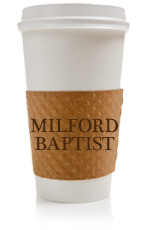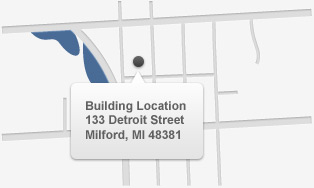-
God has Called us to:
Forever-Fellowship
All-Week-Long Worship
Day-by-Day Discipleship
Moment-by-Moment Mission

Located across the
street from Sweetwaters
in Downtown Milford, MI. -
Church Renewal
Notes on our Studies and Discussions:
Our Bible Study in Ephesians 4 has led us to consider the four functional gifts to the Church. The comparative tool we used last Sunday morning, distinguishing the Missional, Evangelical, and Institutional Churches, suggests 12, though these are not clear categories. A S.Baptist pastor has written a book and founded a ministry call 9Marks, which I will also consider.
Ephesians 4 and the Four Functional Gifts: Apostles, Prophets, Evangelists, and Pastor/Teachers
My observations in this area do not relate to our church alone, but rather to American Evangelicalism in general. As a result, it will be all the harder for our local congregation to walk a different, more Biblical path.
A. To be Apostolic means that, as followers of the living Christ, we live changed lives, and we live to see lives changed, fully engaged in an expanding mission of boldly representing Jesus in word and deed.
If we are not Apostolic, then what are we? It seems that we have been embraced by a comfortable Christianity that enjoys relaxing in the arms of our culture. So long as the culture does not become too offensive in its amorality, and so long as Christians do not become too offensive in their faith, we get along just fine. This is clearly not the approach of the Apostles in the Book of Acts. We have traded confronting the unbelieving world with Accommodation, which means “to make oneself at home with”.
We must find what it means to be less at home in the world, and more at home with God. We must discuss what that means for the leaders, so that we can explain it and model it for the rest.
B. To be Prophetic means that the Word of God is the dynamic and powerful instrument of the Spirit of God, being truthfully applied to both public and private issues of contemporary life
If we are not Prophetic, then what are we? It seems that we are very Patterned, constrained by both recent tradition, and by recent trends. We are taught to read and interpret Scripture according to these patterns rather than according to the illuminating direction of the Spirit.
We must be more honest in our handling of the Word of God, and be ready to question areas where our lives and church do not fit easily with the words of Scripture.
C. To be Evangelistic means to intently listen to the questions that unbelievers are asking, and then to honestly present visually and verbally an answer that clearly presents Jesus as “the Way, the Truth, and the Life.” We need to understand that evangelism is not just an individual activity, but is also a congregational activity.
If we are not Evangelistic, then what are we? We seem to have an attitude of inferiority and a posture of defensiveness, so that if we are to share the Gospel with anyone, they must find a way to penetrate our walls behind which we hide with the Gospel. Instead of practicing Evangelism, we practice Evasion.
In Live to Tell, Kallenberg says that evangelism is not merely persuading someone to accept certain facts, but rather to invite him/her to enter into a new way of life with a new set of people using a unique language with allegiance to a new Lord. Evangelism then, is a process that bleeds into discipleship, whereby people are invited to begin a journey of observing, discovering and knowing what Jesus and following Jesus is about. A redefinition of the meaning of evangelism is fundamental to church renewal, because it calls on us to live what we share, and to share how we live. If there is not fundamental difference between our life and the life of the world, then there is nothing to which people can be invited.
D. To be Pastor/Teacher means to be involved in the care of souls and the equipping of believers to be involved in the cause of Christ as followers of Christ who are growing in their understanding and obedience.
If we are not Tending/Training, then what are we? Actually, this is the area where we do the best. And yet we often are more concerned with caring for people’s feelings than caring for people’s souls. And we tend to be satisfied to impart Biblical information rather than to train for service and engagement with the world. Pastor/Teacher is easily replaced by People-Pleaser/Therapist.
On Another Front, but related to church change:
Problem terms:
worship – usually referring to Sunday at 11, and sometimes specifically of the song time; and yet worship is to be a lifestyle. We should not use the word “worship” in relation to the 11 o’clock service.
service – referring to a gathering of people, but communicating the idea that some person(s) who are active will be “serving” those who are passive. I like the words “congregate”, which has the idea of gathering a flock; and “assembly”, which means to bring together for a common purpose.
church – usually referring to the building; but the church is the people, and God’s house is not made of bricks. We should not use the word “church” in relation to the building. So even a sign on the front of the building that includes the word “church” is misleading.
community – used both of the community of believers, and the surrounding town(s). We should not use the word “community” in two ways, and so probably not in relation to our church family. Of course, most every word has a dual meaning, such as “family” and “body”.
Baptist – used to identify our history in this town, and to associate with a particular tradition, with both its strengths and weaknesses. It has a negative heritage of both Arminianism and legalism.
- “Prayer is a sincere, sensible, affectionate pouring out of the heart and soul to God, through Christ, with the strength and assistance of the Holy Spirit, for such things as God has promised, or according to the Word, for the good of the church, with submission, in faith, to the will of God.” - John Bunyan


